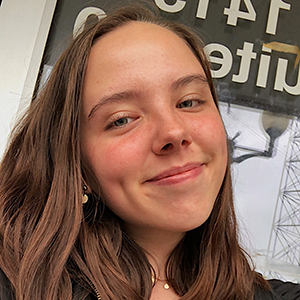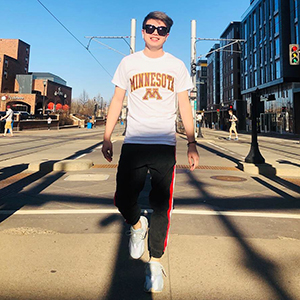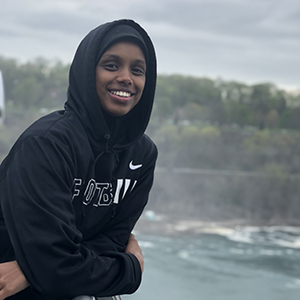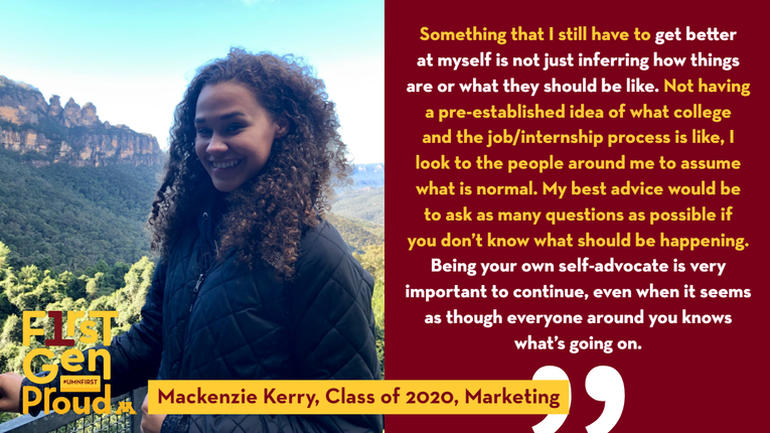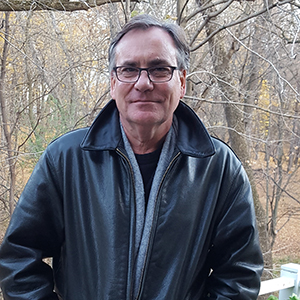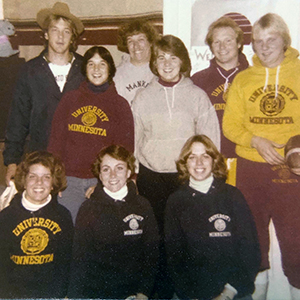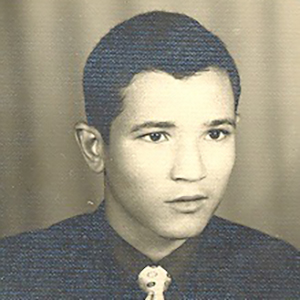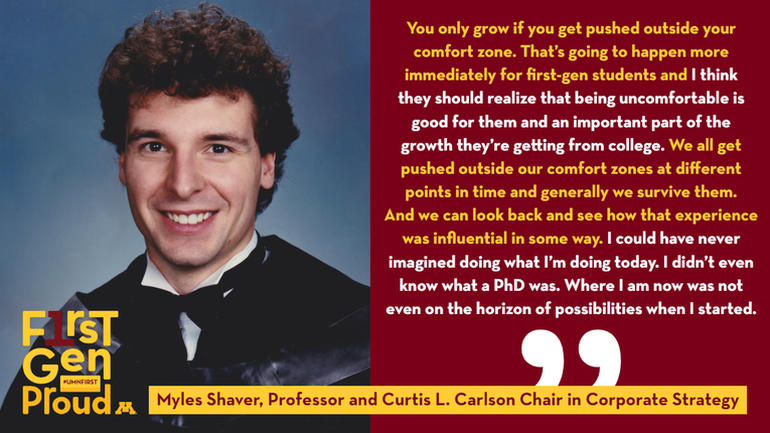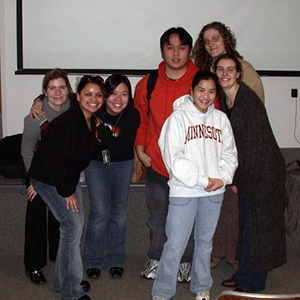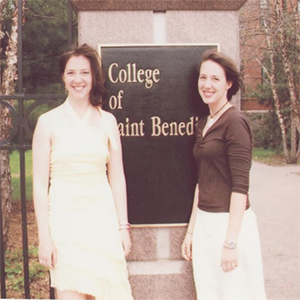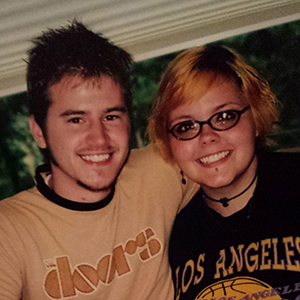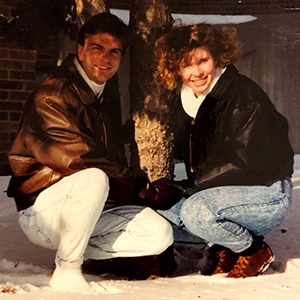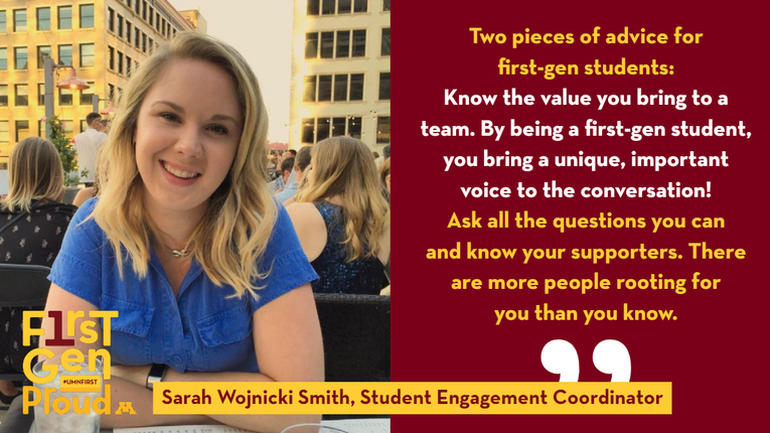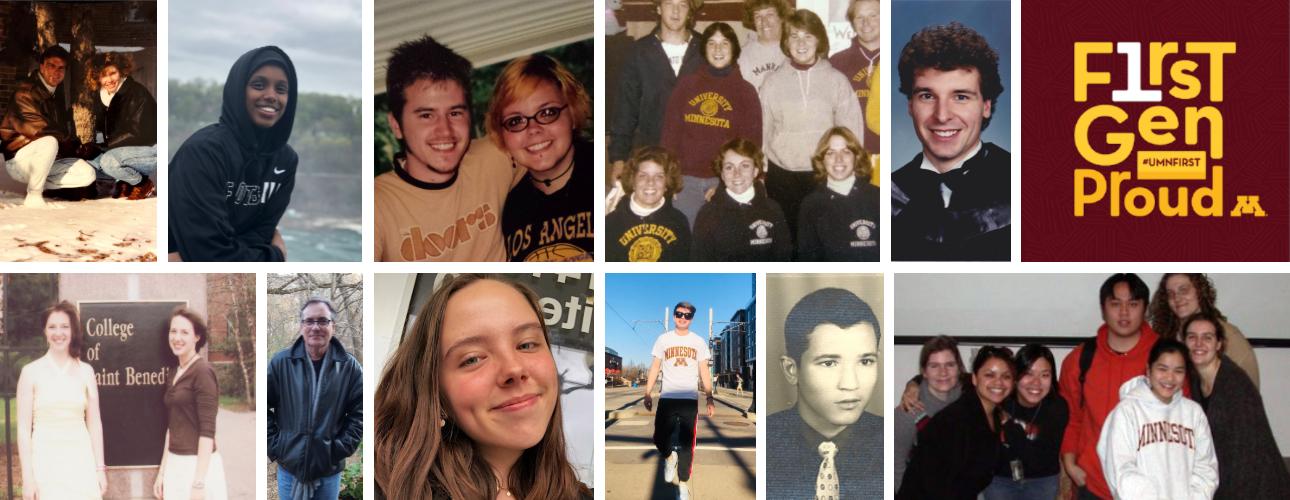
2019: Our Carlson School Community Shares Their First-Gen Proud Stories
Friday, November 1, 2019
Carlson Undergraduate Program students, faculty, and staff reflect on their experiences as first-generation college students—the challenges, triumphs, insight, and impact—as part of First-Generation College Student Celebration Week at UMTC.
Students
Jordyn Tayloe, Class of 2023, Marketing
As a first-gen student, I am extremely proud of the things I have accomplished that have allowed me to get to where I am today, but that wasn't always easy for me. College was a scary, new endeavor being first-gen and I didn't know what to expect. That being said, some advice I can give to other first-gen students is to get out of your comfort zone and don't be afraid to try new things. Don't let your accomplishments be diminished and be proud of everything you've done to get where you are because you deserve it.
Kewei Xiao, Class of 2023, Pre-major
Both of my parents’ highest degree is high school, so academically they cannot give me a lot of techniques or strategies about how to manage all my courses or put them together. Also, when I have career questions or am trying to understand college life, I can’t really turn to them. Before I entered university, the attitude I had toward college was full of question marks for me because we just didn’t talk about it.
As a first generation student, I feel grateful that I have the opportunity to go to college and I’m feeling like it is do-able because I’ve had a strong start. For me as an international student, I feel like it can be even more challenging, because you’re in a brand new environment—the people around you, the country’s laws, the way people act are all new. So in this case, my parents wouldn’t have any suggestions either because they’ve never lived here before.
For me, I also feel like it’s not that big of a deal these days to think about being first-generation. I think there are other places you can go now to learn and take classes. For example, my parents are taking some courses in business and management in China. It’s more about what’s your attitude toward education—not everything has to come from a textbook. Technology and online sources have really developed and advanced and now you can find new ways to study.
Sumaya Mohamed, Class of 2021, Marketing
My mom went to primary and secondary school, she’s from Kenya, and my dad didn’t go to school at all, he’s from Somalia. My mom is a nurse currently leading a group of nurses at a home care. Some challenges I’ve faced as a first-generation student—although I had my older brother and sister who went to college—is that I was on my own to learn how to apply for things, learning what scholarships were out there. I always had to seek out stuff for myself, because my mom didn’t necessarily know how to operate through the systems as I was growing up. So I couldn’t really ask her how to do these things.
Some advice I would give to first-gen students is to always look to your wider network for resources. People are always willing to help, you just have to make sure you’re asking almost any question possible that comes to mind. For me, when I was looking for recommendations or had questions about where to go for higher education and what to major in, I would ask my sports coaches and high school counselors and they provided me with mentors and different groups I could be a part of. Networking can be a huge thing for first-gen students, because your parents don’t have that degree or those connections that most of your other friends’ parents probably have while they were in undergrad. They don’t have those connections to places and organizations you might want to work in one day. Take advantage of all the resources you’re given, especially resources like career fairs and info sessions to help you in your journey after undergrad.
Faculty
Frank Gigler, Professor and Curtis L. Carlson Chair in Accounting
BS, Business, University of Minnesota
PhD, Accounting, University of Minnesota
As a first-generation student, learning how to study was a huge issue for me. I never really had to study in high school and I wasn’t forced to. That was probably the hardest thing. Fitting in with people that seemed to me to be a lot different than I was, was also an issue. Most of the people in the dormitory near where my room was were from the East Coast and Wisconsin—there weren’t a lot of Twin Cities students living on campus at the time and I came from a small town in northwestern Minnesota. But I think I adapt pretty well, so that was helpful.
I wouldn’t say my parents expected me to go to college, but they did everything to encourage me to go. My first quarter, I did abysmally and I was ready to go home. On the advice of my advisor, who didn’t have faith in me being able to get into the business school, I took a foreign language class for the first time ever and I got a D. I think my GPA was between a 1 and 2. My parents really encouraged me to stay and I turned it around. I decided to start doing what I came here to do and focus on what I wanted to do.
When I decided rather than enter the job market, I wanted to get a PhD, my father in particular thought I was crazy. The thing that took the pressure off with my family was that PhD programs pay their students stipends and offer opportunities to earn money teaching. But it was a completely different path. When I got my first job at the University of Chicago, which was my dream job, everything changed.
My advice to first-generation students: you don’t have to start with A’s. I was ready to come home. But I don’t know what I’d be doing if I had.
Mary Benner, Professor of Strategic Management and Entrepreneurship
BS, Economics, University of Minnesota
MBA, Stanford University
PhD, Management, Columbia University
My first-gen story was about both financial issues and about feeling that I didn’t know as much about college as everyone else. I graduated from high school in a small town in Minnesota - where many people didn’t go to college - and I came to the U of M. When I told people I was going to the U, there were a lot of questions. People would ask me, ‘What are you going to do with that?’ Or ‘I know people who went to college and can’t get jobs. Why are you wasting money and time when you could get a job and make money right away?’ I felt pressure to prove there was a good reason to go to college. So I ended up telling people that I was pre-med, because when I said I was going to be a doctor, they didn’t challenge why I needed a college education. Well, it turned out I didn’t want to be a doctor. I switched to economics once I figured out that you should try to find what you’re actually interested in.
My father had died, and my family couldn’t provide much support, so I worked at paid jobs through college. Most of my friends had a lot more money for the usual college experiences than I did. I had friends who could go out for dinner, while I was worrying about whether I could pay my tuition. So I sometimes had to skip the social events.
Some advice for first-gen students? I think some aspects of being a first-gen student can make you feel alienated—you might feel like everyone’s different from you and that they are all the same. I think it’s important for students who feel like they don’t fit in well to understand that everyone else is not all the same. Many students are facing challenges. Other students might feel the same way as you.
Also, try to let yourself be a college student, despite the pressure to get through college efficiently. Allow yourself to take advantage of this cool university and learn stuff that you won’t have the chance to learn again. Give yourself opportunities to learn so you can find what you’re interested in, even if it is not where you thought you were heading when you came to Carlson. It turns out I didn’t do pre-med. I changed my major to econ. People from home would ask, ‘What are you going to do with that?’ And I had no idea, but I was excited to find out.
Shaker A. Zahra, Department Chair Strategic Management & Entrepreneurship Department, Robert E. Buuck Chair of Entrepreneurship, Academic Director of the Gary S. Holmes Center for Entrepreneurship
B. Commerce, Management, Al-Azhar University
MBA, Management/MIS, National University
PhD, Business Administration, University of Mississippi
I grew up in Egypt on a little farm. I grew up with my uncle, who had four years of education and my grandmother who had one week of education. She was the one who actually pushed me to go to school. Her ambitions for me were really high—she wanted me to finish high school, get a job, and stay close to the farm. I was doing well in high school and that did not surprise my grandmother; she believed in me. She changed her mind when I told her I really wanted to go to the university. Her biggest prayer from that day forward was that she would live long enough to see me go to college and she passed away the first day I went to school. But she knew I was going.
I went to the oldest university in Egypt, which is over 1,000 years old, and I studied business. That was a process of incredible adaptation because for the first time I was exposed to people from different countries. Up to that point, everyone around me was usually from the same part of the state. That really imprinted on me about how I see the world. That diversity became something to not fear, but something to celebrate.
I also remember trying to find out what I really wanted to do. I started with economics, switched to accounting and ended up in management. Along the way, I studied theology. My relatives had a functional view of my education: you need to study something that will get you a job. And my view of that was far more elusive. I wanted to know as much as I could, so I chose this program that was five years rather than four and that really drove them nuts, too. I was honestly not sure what I wanted to do and I thought this was one of the few chances in life I would have to explore. I knew I would like be an academic—I always hoped I would be one—but did not know if it would materialize.
First-gen students have a special role because they are breaking barriers. They are knowledge transfer agents. They learn and they take some of this learning home, too. I think that’s something we don’t think about very much. My uncle would ask me a lot of questions when he saw me studying or ask about classes. There was a lot of curiosity, it was just natural. These first-gen students can transfer all these values and knowledge home. They build a different sort of connection with their families.
The other thing I learned a lot about was connecting with people who are very different from me. It opened a lot of doors for me. First-gen students shouldn’t be afraid of their new world...it can be a fulfilling and liberating experience!
Staff
Chinh Truong, Academic Advisor
BS, Genetics, Cell Biology, and Development & Psychology, University of Minnesota
MA, Counseling Psychology, University of St Thomas
As a first-gen, commuting student at the U, I didn't know who to turn to for answers about day-to-day things nor longer-term strategic planning. I felt lost and alone for the first semester, exploring campus alone, getting lost from time to time. Even though I had a couple friends from high school attending the U with me, we very quickly fell apart since they lived on campus and found new friend groups.
My academic advisor recommended the Biology Colloquium course, a course run by students, for students, and I was able to expand my network vastly as I climbed the ladder from student to student-leader to student-coordinator. I moved in with a few of them sophomore year and have been lifelong friends since. That program also offered me a faculty mentor who encouraged me when things were really rough, supported me when I needed help, and challenged me to stretch and go beyond my comfort zone, which was already very small given my background and personality in such a large and bustling environment. My photo is of me in college with this group. I would not be where I am today without the amazing people within this program.
Now, as a staff member, I am committed to contribute in ways I wish I had available to me when I was a student. I hope that all first-gen students are able to find a way to meaningfully connect with peers, staff, and faculty to help make the U a more intimate space. I also hope that first-gen students discover their unique strengths, talents, skills, knowledge, and outside-the-system perspective to give back to the University in their own way to support others.
Good luck out there! And consider this an invite to meet with me if you are a first-gen student looking to better understand your experiences on campus.
Jessica Himmerick, Chief of Staff
BA, Psychology and Spanish, College of St. Benedict
MA, Organizational Leadership and Policy Development, Higher Education, University of Minnesota
I've always thought the irony of celebrating first-gen students is that this is the group that likely doesn't even realize that they are first-gen! I never knew what it meant or that I was one until I was in a Masters class in Higher Education and we talked about who these students are. Then it made so much sense! My twin sister (brown shirt) and I (yellow dress) were entirely self-directed in figuring out and navigating the college process. First-gen students are known for being resourceful—and we certainly were—as they don't get the same "cultural capital" or "how-to" knowledge passed down to them about getting into and navigating college. I remember my twin and I researched schools, costs, application processes, and then we were the ones that told our parents what we needed to do, and what needed to happen next.
And yet, despite resourcefulness, there were still things that I didn't know. I most distinctly remember visiting the Career Center during the spring semester of my senior year, thinking, 'I suppose it's time to start looking for a job now.' I had NO IDEA that you should build up your marketability during the four years of school through summer jobs, internships, clubs, leadership roles. I still keep my terrible, terrible first resume up in my office to remind me of where I started. Fast forward 10 years and I was one of Carlson's BA 3000 Career Skills instructors teaching students how to write resumes and navigate the career process, and subsequently spent 4 years in advising helping students navigate a higher ed system I didn't understand when I was a student. Even though I've been working in higher ed almost 15 years, I still feel my first-gen status as I've navigated life as both a Master's student and PhD student (soon to be graduate!)
Jessie Behr, Academic Advisor
BA, Cinema & Media Culture, University of Minnesota
MA, Leadership in Student Affairs, University of St. Thomas
I think one of the biggest challenges in being a first-generation college student is not knowing what you don't know, and not knowing the questions to ask. This was true for me when I was a college student, and it's sometimes still true now that I'm an academic advisor. It's OK to be vulnerable and lean on others to help you navigate your college experience—especially your advisor; that's what we're here for! Always ask questions, even if your question is, "How do I know which questions to ask?"
Kathy Evenson-McDermott, Academic Advisor
BA, German, Hamline University
MA, Educational Psychology, University of Minnesota
Education was a priority in my dad’s eyes. He expected that his daughters would go to college, something he did not get to do, but very much wanted to do. His father died when he was 7 years old and he helped his mother and sister run the farm and a quarry business. Graduating as valedictorian, he wanted to go to college and study civil engineering, but there was no money. He was mentored by the agriculture teacher at his high school and had grown quite fond of farming by this time and knew he could also love this and be good at it. Growing up, my dad subscribed to National Geographic and made sure that we had a family vacation each summer of some type to see the world around us. I can attribute where I am today because of the value he placed on education and seeing the world.
